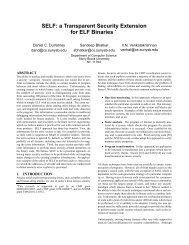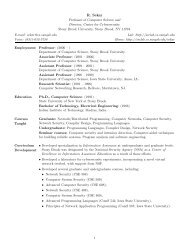Exception Handling in C++/Java
Exception Handling in C++/Java
Exception Handling in C++/Java
You also want an ePaper? Increase the reach of your titles
YUMPU automatically turns print PDFs into web optimized ePapers that Google loves.
Coalesc<strong>in</strong>g<br />
What if a program allocates many 8 byte chunks,frees<br />
them all and then requests lots of 16 byte chunks?<br />
• Need to coalesce 8-byte chunks <strong>in</strong>to 16-byte chunks<br />
• Requires additional <strong>in</strong>formation to be ma<strong>in</strong>ta<strong>in</strong>ed<br />
• for allocated blocks: where does the current block end,<br />
and whether the next block is free<br />
Explicit Vs Implicit Management<br />
Explicit memory management can be more<br />
efficient, but takes a lot of programmer effort<br />
Programmers often ignore memory management<br />
early <strong>in</strong> cod<strong>in</strong>g, and try to add it later on<br />
• But this is very hard, if not impossible<br />
Result:<br />
• Majority of bugs <strong>in</strong> production code is due to memory<br />
management errors<br />
• Memory leaks<br />
• Null po<strong>in</strong>ter or un<strong>in</strong>italized po<strong>in</strong>ter access<br />
• Access through dangl<strong>in</strong>g po<strong>in</strong>ters<br />
CSE 307 Spr<strong>in</strong>g 2004<br />
R. Sekar<br />
13<br />
CSE 307 Spr<strong>in</strong>g 2004<br />
R. Sekar<br />
14<br />
Manag<strong>in</strong>g Manual Deallocation<br />
How to avoid errors due to manual deallocation<br />
of memory<br />
• Never free memory!!!<br />
• Use a convention of object ownership (owner<br />
responsible for free<strong>in</strong>g objects)<br />
• Tends to reduce errors, but still requires a careful design from<br />
the beg<strong>in</strong>n<strong>in</strong>g. (Cannot ignore memory deallocation concerns<br />
<strong>in</strong>itially and add it later.)<br />
• Smart data structures, e.g., reference count<strong>in</strong>g objects<br />
• Region-based allocation<br />
• When a bunch of objects hav<strong>in</strong>g equal life time are allocated<br />
Garbage Collection<br />
Garbage collection aims to avoid problems<br />
associated with manual deallocation<br />
• Identify and collect garbage automatically<br />
What is garbage?<br />
• Unreachable memory<br />
Automatic garbage collection techniques<br />
have been developed over a long time<br />
• S<strong>in</strong>ce the days of LISP (1960s)<br />
CSE 307 Spr<strong>in</strong>g 2004<br />
R. Sekar<br />
15<br />
CSE 307 Spr<strong>in</strong>g 2004<br />
R. Sekar<br />
16





